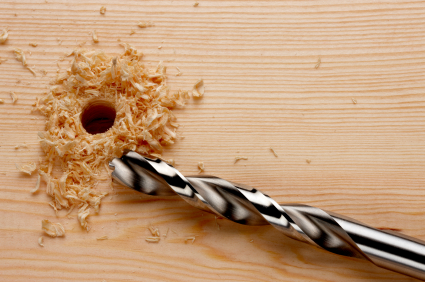
Drill Bits or Holes?
by Peter Cotton, founder and president of Best Sales Talent, LLC
On evaluating a sales candidate’s skills before assisting him making a job change, I frequently ask the question:
“What do you envision your next sales job to look like?”
Frequently the response given is in self-centered terms:
“I want it to be a salaried job, with commission, plus a car, benefits and expenses.”
So I ask it again a different way:
“What do you envision yourself selling?”
The response to this question is often:
“I want to sell a tangible product.”
I ask why and the reply usually is:
“I have to be able to hold it in my hand to believe in it and to be able to sell it.”
The last response tells me that the person I am speaking with has little sales experience, little sales training, or simply doesn’t truly understand his profession. I’m fascinated by this response and usually tell the following story with a question at the end.
“There is a company called Cleveland Twist Drill. They manufacture drill bits of every size and for every application imaginable. Their drill bits are used by various industries as well as do-it-yourselfers to drill into wood, metal, cement, plastic and a host of other very specialized materials. If you were a sales representative working for them, what would you be selling?”
Usually, the sales candidate hardly hesitates and says: “Drill bits!”
“No,” I respond. They look at me as if I were nuts. “Think again,” I say.
Confused and not sure why I am asking such a seemingly obvious question, they look at me with a questioning look and ask, “Isn’t it drill bits?”
“Nope. That is not what the customer is buying from Cleveland Twist Drill. The customer really wants holes. As an example, Cleveland Twist Drill sold their drill bits to Boeing, who makes aircraft. Boeing needs consistent, perfectly-formed holes so that all the rivets fit into the aircraft they are making. They need the holes to all be uniform so that everything will fit together properly. The drill bit provides the ultimate desired benefit of the perfect hole. So what you’d be selling is not the tangible product of the drill bit, but the intangible benefit they provide, which are the holes. Boeing is also receiving some other intangible benefits, like increased production, time savings and money savings – all of which are intangibles.”
After my little story about Cleveland Twist Drill, the sales candidate starts to understand.
<><><><><><><><><><><><><><><>
(As an aside, Cutting Tool Supply, Inc.’s website shows the following example: Drilling a 0.228″ Diameter Hole 1.1″ Deep in 316 Stainless
The Problem:
A customer was drilling 0.228″ diameter holes 1.1″ inch deep in 316 stainless steel. The tool he was using was a TiCN coated cobalt drill which he was buying at a cost of $9.95 each. The drills were being run at 600 RPM and being fed at 1.8 IPM in a peck drill cycle. Productivity and tool life were unsatisfactory. Each drill was lasting about 200 holes before having to be replaced.
The Solution:
We proposed an RTW Type H solid carbide coolant through drill at a cost of $75.00 each. This drill was run at 1,200 RPM in a straight drill cycle (no peck drilling) feeding at 3.6 IPM. One drill ran the entire lot of parts (2,000 holes), and was put back in the drawer for the next run of parts. Total tooling cost was reduced from $99.50 to $75.00. More importantly, the customer reported an increase in productivity of 100% and was thrilled with the results.
<><><><><><><><><><>
All businesses are service businesses. The problem is that many sales people don’t truly understand what business they are in. Nobody wants to buy the things or the services that are being offered. They want what those things or services DO FOR them.
Budweiser isn’t selling you how good the beer is – they are suggesting that drinking it is fun, something to do with friends at a party, at a sports bar watching a game, being around members of the opposite sex or where everyone is having a good time on a sunny day at the beach. That’s what people want. Herbal Essence Shampoo isn’t selling you on how good their shampoo is, but on the silky feeling and fragrant smell you will have after using it. That’s what women want. Old Spice Aftershave isn’t selling aftershave, but the wonderful aroma you will have that women will adore. That is what men want. GM’s Cadillac division isn’t selling you on the expensive components of their car, but on the prestige you will achieve by owning one. Chevrolet’s Corvette line isn’t selling you on their fiberglass body vehicle, but on the macho image or the feeling of power you will get from diving it. Toyota’s Camry Hybrid isn’t selling you an electric/gas hybrid engine, but the economies that you will enjoy from not spending so much on gas. Life Insurance companies are not selling policies, but the peace of mind that your family will be well provided for in the case of your untimely death, and that by purchasing it, you will avoid feeling guilty for not having provided for them. Women are told that a particular laundry detergent will save them the embarrassment of sending their husbands off to work with a yellow stained collar on their shirts. The admiration your friends and family will provide as they comment on your sparkling dishes and glasses, since you used the latest dishwashing detergent. A pharmaceutical company isn’t selling pills, but the good health you will enjoy by ingesting them. And so on.
Customers buy prestige, ego-gratification, security, time-savings, money-savings, success, improved self image, recognition, a need to feel worthy, respected and even loved, as well as many other things. They will pay to get it, too. Bottom line is that people buy the benefits that a tangible product can provide, not the tangible product itself. Once a sales person truly understands this, they will advance from a mere peddler of products to a well-respected consultative sales professional.
See my earlier blog post here: Selling Benefits




